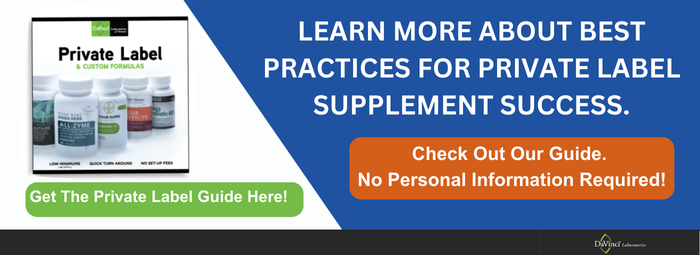.png?width=750&height=400&name=DaVinci.LitX%20(2).png)
Healthcare professionals and business owners alike know that dietary supplements are one of the fastest-growing markets in the wellness industry. Recent studies by the Council of Responsible Nutrition show that nearly three-quarters of the adult American population uses supplements in their daily health practices.
However, anyone interested in selling supplements should understand the nuances of the market. You should be familiar with industry regulations and different product categories. In this article, you’ll learn how to sell supplements in a way that benefits your customers while growing your business.
Understanding The supplement market
Today’s consumers consider supplements an important part of their holistic wellness regime. They look for natural ingredients, and they know how to read labels. They care about their mental well-being and energy and look and feel their best.
According to a study by the University of Wisconsin, the market skews towards college-educated women who integrate supplements into their daily lives. They also tend to already be fit, have a fitness regimen, and enjoy active lifestyles. However, outside the target profile in the study, you can sell supplements to a wide variety of consumers.
There are six main categories of dietary supplements. They are:
- Vitamins, including multi-vitamin formulas
- Minerals
- Botanicals and herbs, also sold in formulas
- Botanical compounds, such as caffeine
- Amino acids
- Probiotics

Identifying Your Target Market
As you consider selling private-label products, think about your target audience. The supplement market is segmented into groups by age, lifestyle, and health goals. The more refined your target market, the easier it will be to connect them with the best supplements.
Along with the different demographics, you’ll want to consider other habits and behavioral motivations that would encourage the purchase of supplements. This helps with inventory, design, and strategies. The better you know your market, the better you’ll be able to meet their needs.
building your product range
The next step is ensuring a balanced inventory with a mix of popular and niche supplements that meet your target consumer’s needs. For example, you’ll want a variety of product formats, including chews, liquids, and powders.
You will also want to balance commercial brands with white-label products and private-label products. White-label products are generic and sold to multiple companies that add their branding, which means you can get them to market faster and at a lower cost.
Private-label supplements are manufactured by someone else but exclusive to your brand. You can get these products on your shelves through strategic partnerships with reputable manufacturers and suppliers. Private-label supplements offer a great opportunity to build customer loyalty and usually bring more long-term profits.
Marketing and branding strategies
To establish a strong brand presence, you’ll want to create a marketing strategy that includes online and offline techniques. An online strategy might be to maximize social media reach through influencer partnerships. Look for profiles with a following that overlaps demographically with your target audience. Then, reach out to influencers with proposals focusing on partnering with them to educate potential customers about the benefits of your supplements.
Augment this marketing work with content-related strategies like blogs, videos, and targeted social media posts. Offline marketing strategies include the creation of posters and flyers displayed in stores on shelves or at the point of sale.
E-Commerce and digital transformation
Not everyone who wants to learn how to sell dietary supplements will want a traditional brick-and-mortar store. In fact, it might be advantageous not to have a physical store. Even if you do have one, you’ll need a digital presence in the form of a user-friendly e-commerce store. When you have a strategic website, you can draw in more customers through the power of search engine optimization (SEO) and other digital marketing strategies.
Remember, no matter how powerful your marketing, you’ll still need to provide excellent service and a great product. One way to improve your customer relations is to create a loyalty program within your online store that provides an added incentive to return to your business.
Always encourage consumers to review your products on consumer rating sites relevant to your target market.
Managing Inventory and Logistics
As you start your supplement business, you must have an efficient inventory management plan. Learn about minimum order quantities, or MOQs, to balance purchasing requirements with inventory tracking and forecasting.
A common industry challenge is learning how to handle logistics, shipping, and returns in a way that satisfies customers. Monitor your competition's inventory to ensure you are covering the market, and be aware of regulatory changes that may require you to pull products or include others on your shelves.
Regulatory compliance and quality assurance
Supplement sales require abiding by the regulations set by the U.S. Food and Drug Administration. The FDA does not approve any supplements for effectiveness, but it does oversee safety, quality, and labels. Per the FDA’s rules, you cannot legally promise guaranteed results for specific ailments or concerns, and you must have all nutritional information on the label.
Since transparency is essential to building customer trust, ensure your supplements have the highest-quality ingredients. Focus on proper sourcing and a certification process that includes third-party testing.
How to sell supplements: Know your market
Selling supplements requires a thoughtful business and marketing plan. Before entering the market, write out your strategy and complete your research.
Once you’ve started your business and connected with your target audience, studying the market continually is important. This way, you’ll be able to adapt quickly and stay ahead of the competition. Start by understanding private-label supplements so you can implement these strategies today.








.png?width=750&height=400&name=DaVinci.LitX%20(2).png)










